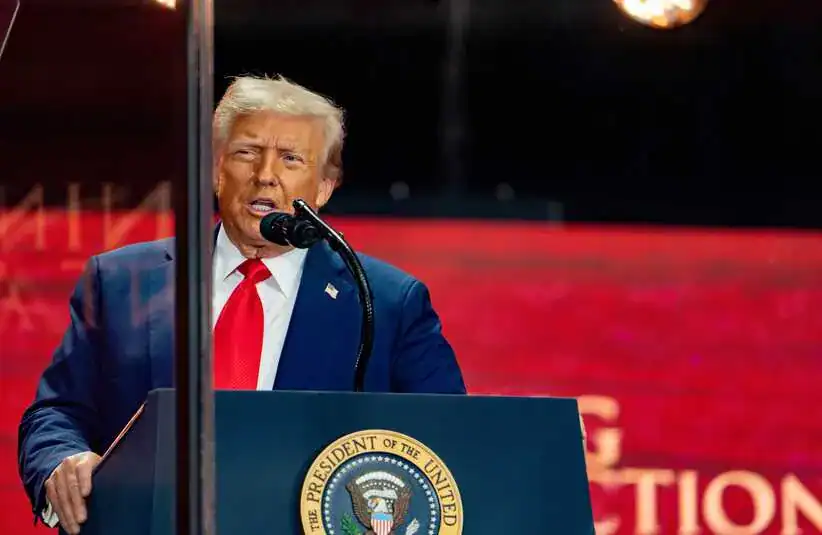Donald Trump Threatens BBC Lawsuit Over Explosive Panorama Edit
The ongoing saga between Donald Trump and the British Broadcasting Corporation (BBC) has escalated into a full-blown media war, and it’s a story that feels ripped straight from a political thriller. At the heart of it all is a controversial edit in a BBC Panorama documentary, a billion-dollar lawsuit threat, and the resignations of top executives from the corporation.
Trump’s Billion-Dollar Lawsuit Threat Against the BBC: A Deep Dive
The controversy centers on the BBC’s editing of Trump’s January 6, 2021, speech. In a Panorama documentary that aired in October 2024, the BBC spliced together two separate parts of the President’s address. He first told his supporters, “We’re going to walk down to the Capitol, and we’re going to cheer on our brave senators and congressmen and women.”
Over 50 minutes later, the President said, “And we fight. We fight like hell.” The Panorama edit presented it as a continuous statement: “We’re going to walk down to the Capitol… and I’ll be there with you. And we fight. We fight like hell.” This edit created the impression that Trump was directly and immediately inciting his followers to “fight like hell” at the Capitol, a narrative that has been intensely debated ever since.
The BBC released a statement apologizing to the President but said it wouldn’t pay financial compensation. In addition, the corporation said, “The BBC would like to apologise to President Trump for that error of judgement.”
PBS reported the BBC’s statement saying, “We accept that our edit unintentionally created the impression that we were showing a single continuous section of the speech, rather than excerpts from different points in the speech, and that this gave the mistaken impression that President Trump had made a direct call for violent action.”
Trump’s Fury and the Billion-Dollar Threat
When this edit came to light, the backlash was swift and severe. Trump and his legal team were furious, accusing the corporation of deliberately misleading the public and defaming him. They didn’t just ask for a correction; they came out swinging. Trump’s lawyers sent a letter to the British public service broadcaster demanding a full retraction, a public apology, and significant financial compensation, setting a Friday deadline.
BBC reported Donald Trump speaking to reporters on board Air Force One, saying, “We’ll sue them for anywhere between $1bn[£759m] and $5bn, probably sometime next week.” He added, “I think I have to do it,” Trump stated, framing it as an “obligation” to prevent similar incidents from happening to others. This wasn’t just a threat; it was a declaration of war against one of the world’s most established media institutions.
This situation has been nothing short of a catastrophe. The fallout has been immense. Faced with overwhelming pressure, two of the corporation’s most senior executives, Director General Tim Davie and Head of News Deborah Turness, resigned. Their departures sent shockwaves through the industry, signaling just how serious the crisis had become. It was a stunning admission of failure at the highest level.
However, they drew a line in the sand. While they apologized for the editorial “error of judgment,” they have firmly refused to pay any financial compensation, stating they “strongly disagree there is a basis for a defamation claim.” This sets the stage for a monumental legal battle. The corporation is essentially daring Trump to follow through on his threat, arguing that the documentary was not aired in the US, did not cause him direct harm (as he was re-elected), and was not edited with malice.
This conflict puts the BBC in an incredibly difficult position. As a publicly funded broadcaster, the prospect of spending millions in taxpayer money to fight a legal war with a determined and litigious figure like Donald Trump is a “nightmare” scenario, as one former BBC editor put it. Trump has a history of suing media outlets, and he often plays the long game.
The core of the issue is trust. The BBC’s reputation is built on impartiality and accuracy. This scandal has deeply damaged that trust, raising questions about institutional bias that the corporation is now desperately trying to combat. Meanwhile, politicians are weighing in, with some defending the BBC’s independence and others criticizing its internal failures.
Final Thoughts
As of now, the world watches and waits. Will Donald Trump file the lawsuit? And if he does, how will the BBC defend itself in a US court, where defamation laws differ from the UK’s? This is more than just a legal dispute; it’s a clash of titans, a battle over media ethics, and a political drama with global implications. One thing is certain: the fallout from this edited clip is far from over.

